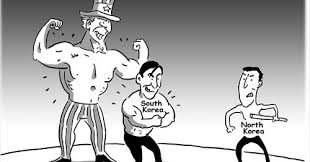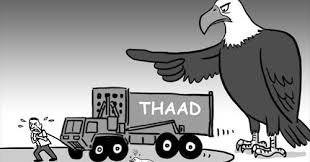https://youtu.be/TOE3yXY7ygU
https://youtu.be/Y4tPFchrzAw
https://youtu.be/XdW60MUtoXc
https://youtu.be/cM8Ee5dRdQQ
North Korea's official media announced today the country had successfully conducted a nuclear test, confirming international media reports that Pyongyang had carried out its fifth nuclear test. A 5.0-magnitude earthquake in North Korea was detected by overseas monitoring services. South Korea claims the explosion was equivalent to about 10,000 tons of TNT, the most powerful one North Korea has tested thus far.
Today’s test happened only eight months after the claimed hydrogen bomb test of January, the shortest time span between any two previous tests. Two weeks ago, North Korea conducted a submarine-launched ballistic missile test, and a few days ago it launched three missiles.
Pyongyang seems to be set to intimidate the US and South Korea, who are exerting more military pressure. It is also trying to force the international community to abandon their efforts to seek a nuclear-free Korean Peninsula. But the efforts only drew a backlash. It has created anger and embarrassment, but unlikely to scare the outside world. The other five countries of the Six-Party Talks, which are now in a deadlock, are unlikely to make concessions.
North Korea should bear in mind that nuclear weapons are only a strategic deterrent tool and cannot be resorted to. North Korea has scarce resources and its economy is limited, therefore, even if it has the ability to make nuclear bombs, the number of its nuclear arsenal would be small, so it could not reach the minimum threshold of a global nuclear power. Its nuclear capability would pale in comparison with the nuclear prowess of the US. The US believes if North Korea uses nuclear weapons first, it would lead to its destruction. North Korea is not capable of ensuring an effective strike-back after being hit by a nuclear weapon. Several factors combined, North Korea cannot build a nuclear deterrent in the traditional sense.
Look at how much Pyongyang has sacrificed to develop nuclear weapons. It has become the world’s most isolated country. It is suffering from extreme economic difficulties and sees no hope of getting out of trouble any time soon. No North Korean leader has visited China in the past few years. Its top leader diplomacy is almost zero. Owning nuclear weapons appears to have added a strategic tool for North Korea. But the severance of diplomatic channels means the “growth in national strength” cannot transform to influence.
Northeast Asia is in a mess. The THAAD issue has led to a stalemate between China and the US-South Korea alliance. North Korea is taking advantage of this, hastening its nuclear tests. Seoul believes the new North Korean tests make it more necessary for the US to deploy the THAAD missile system.
They are all wrong. What they are doing will only drag Northeast Asia into deeper chaos. The Korean Peninsula will become an even more dangerous powder keg.
Owning nuclear weapons won't ensure North Korea's political security. On the contrary, it is poison that is slowly suffocating the country. It is turning into a country possibly with one or two nuclear bombs but nothing else - no prosperity, no opening up, no confidence in national security. Pyongyang will have to always be on alert.
North Korea has not become any stronger because of its fifth nuclear test. The Korean Peninsula nuclear issue knot has merely tightened.
It's North Korea's national day on Friday. We understand how eager the country wants to boost morale and enhance national cohesion. But the nuclear weapon that’s more like a firework for the North Korean people may well become one that signals a new crisis. We sincerely hope North Korea is aware of the situation and open to advice. Global Times
Blame DPRK's fifth nuke test on THAAD
Democratic People's Republic of Korea said on Friday, its 68th National Day, that it "successfully" tested a nuclear warhead in the morning. This is the fifth nuclear test conducted by Pyongyang since 2006 and the second this year. The DPRK only on Wednesday rejected a UN Security Council statement condemning its latest missile tests and threatened to take "further significant measures".
China's Ministry of Foreign Affairs has issued a statement censuring Friday's nuclear test and urging the DPRK to meet its denuclearization commitments.
In the Republic of Korea, the presidential office reportedly held a National Security Council meeting on Friday afternoon after "a seismic event" of magnitude 5.3 was detected near the DPRK's northeastern nuclear test site.
The nuclear test carried out by the DPRK on Friday should not come as a big surprise given the planned deployment of the US' Terminal High Altitude Area Defense system in the ROK. In other words, the almost confirmed deployment of THAAD, an anti-missile defense system, has prompted Pyongyang to continue its ill-designed foreign policy.
Judging by its latest nuclear test, the DPRK still stands firm on its strategic misreading, believing that by developing nuclear weapons it will pressure the United States to respond to its concerns. That also explains why the DPRK has conducted missile tests this year even though THAAD might not necessarily pose a major threat to it.
Besides, a nuclear test on the 68th National Day of the DPRK also has a noteworthy political implication - that top leader Kim Jong-un will keep expanding the country's nuclear arsenal.
But it does not suggest the situation on the Korean Peninsula is out of control, because Pyongyang's nuclear efforts usually follow US and ROK military moves.
China is determined to divert this trajectory toward a peaceful direction. But admittedly, China's strategic choices in the face of a rising nuclear threat in the neighborhood are limited because of the geopolitical complexity and the denuclearization process may take five to 10 years to complete. So Beijing has been urging all parties concerned to make more concerted efforts to becalm the ensuing turbulence.
Washington and Seoul, in particular, should sincerely rethink their decision to install THAAD on the peninsula and review their other strategic mistakes that have prompted Pyongyang to make the wrong steps.
A vicious cycle is in the making between the US and the ROK on one side and the DPRK on the other, which can make peaceful reunification of the peninsula even more unlikely. In fact, if tensions continue to rise on the peninsula, the DPRK and the ROK will eventually be the worst victims.
The peninsula policies adopted by the US and the ROK are not conducive to lasting peace, as they have exhausted the very few opportunities to replace the 1953 armistice with a peace treaty.
As US President Barack Obama will leave office in four months and his ROK counterpart Park Geun-hye faces a presidential election next year, there is hope their successors (if there is one in the ROK) would make a difference and forge a permanent peace and security mechanism with China.
The author is a researcher in Asia-Pacific strategy at the Chinese Academy of Social Sciences. The article is an excerpt from his interview with China Daily's Cui Shoufeng.
By Wang Junsheng (China Daily)
The author is a researcher in Asia-Pacific strategy at the Chinese Academy of Social Sciences. The article is an excerpt from his interview with China Daily's Cui Shoufeng.
Related posts:

Aug 24, 2016
... At a time when Beijing and Seoul are in a tug of war on the deployment of the
Terminal High Altitude Area Defense (
THAAD) anti-missile ...

Aug 11, 2016
... The deployment of the Terminal High Altitude Area Defense (
THAAD) missile
defense system will not neutralize the threat of North Korea's ...

Jul 22, 2016 ... More than 2,000 people from Seongju county, where one THAAD battery will be
deployed, gathered at a square in Seoul for a rally on ...




 Angry lot: People chanting slogans during a rally demanding Park step down, in central Seoul. — Reuters
Angry lot: People chanting slogans during a rally demanding Park step down, in central Seoul. — Reuters

